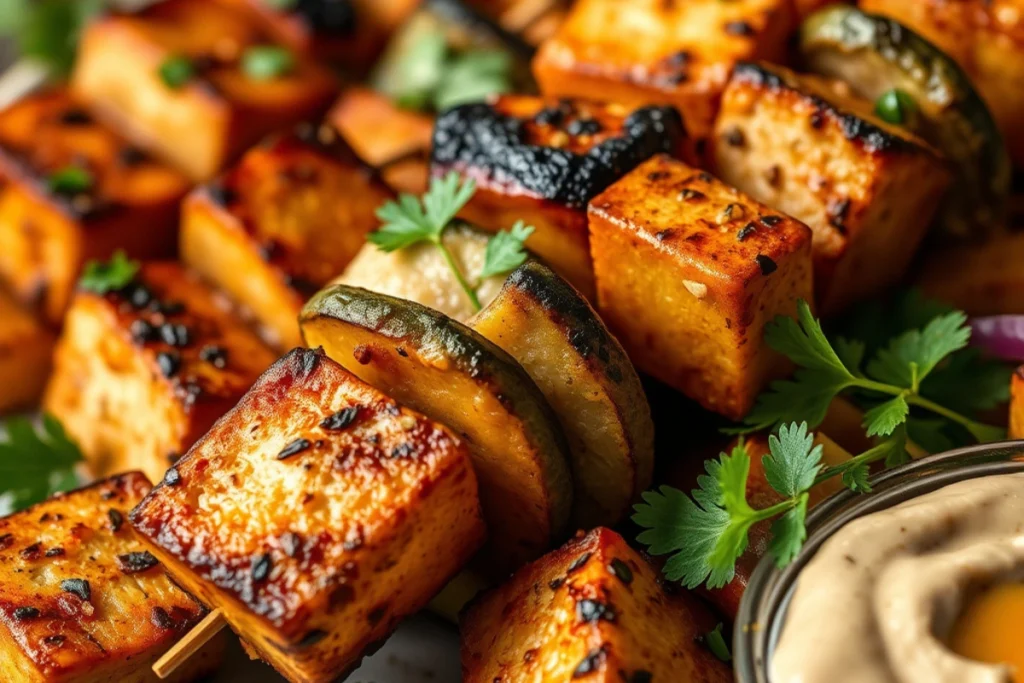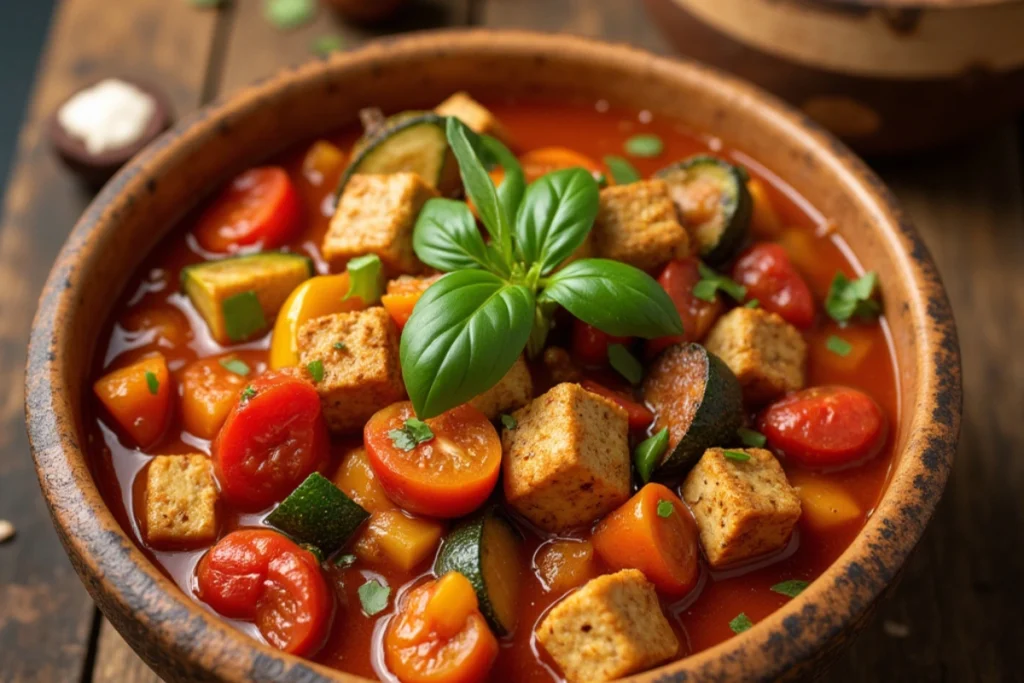What is a Mediterranean Meat Substitute?
Mediterranean meat substitutes are plant-based alternatives that replace traditional meats in Mediterranean meals. They bring the same rich flavors and textures as meat but offer more health benefits. If you’re looking to cut back on meat or try healthier, sustainable options, Mediterranean meat substitutes are a great choice. These alternatives are packed with protein, fiber, and healthy fats, making it easy to enjoy delicious meals while supporting your health. Options such as chickpeas, lentils, and quinoa are integral to popular recipes across Mediterranean cuisine.
In this article, we’ll explore Mediterranean meat substitutes, why they’re a smart addition to your diet, and how to use them in your meals. From legumes and tofu to seitan and tempeh, these plant-based options are nutritious, versatile, and easy to cook with. Incorporating Mediterranean diet staples like fava beans and bulgur wheat can transform your meals into nutrient-dense dishes that align with sustainable eating practices. For more ideas on plant-based Mediterranean cuisine, consider dishes featuring tofu in Mediterranean diets or recipes focusing on vegan Mediterranean main courses.
Introduction to Mediterranean Meat Substitutes
Mediterranean meat substitutes are made from plant-based ingredients and replace animal proteins in Mediterranean-style dishes. They offer the same great textures and flavors while being healthier and more sustainable. Many of these substitutes, like tofu, seitan, and legumes, are nutrient-rich and can easily be added to your favorite Mediterranean meals.
These substitutes give you an easy way to enjoy Mediterranean cuisine without meat. They add protein, fiber, and essential vitamins, making them an excellent option for anyone looking to eat healthier. Incorporating options like chickpeas and lentils into dishes like stews, salads, or soups ensures you get the essential nutrients while savoring Mediterranean flavors.
Choosing Mediterranean meat substitutes not only helps your health but also benefits the planet. These alternatives have a smaller environmental footprint than animal-based foods, making them a smarter choice for sustainability. Adding options like quinoa or fava beans to your meals supports eco-friendly eating while allowing you to enjoy the richness of Mediterranean cooking.
Why Choose a Mediterranean Diet?
The Mediterranean diet is well-known for its health benefits, particularly in improving heart health. It focuses on fresh fruits, vegetables, whole grains, and healthy fats, with a moderate amount of fish and olive oil. The Mediterranean diet is naturally plant-focused, making it easy to include Mediterranean meat substitutes.
Choosing Mediterranean meat substitutes supports this heart-healthy diet while lowering your intake of meat and saturated fats. These substitutes provide protein, healthy fats, and fiber, all of which help maintain a healthy body. Options like lentils, chickpeas, and quinoa align perfectly with the diet’s emphasis on nutrient-dense, plant-based ingredients.
By switching to Mediterranean meat substitutes, you don’t just support your health—you also make a positive impact on the environment. These plant-based alternatives reduce your reliance on meat, aligning with sustainable eating practices, and help preserve the Mediterranean diet’s principles of balance and wholesomeness.
Health Benefits of Mediterranean Meat Substitutes
Mediterranean meat substitutes bring plenty of health benefits. These plant-based options are packed with protein, fiber, and healthy fats that help improve heart health and digestion. Many substitutes like tofu and seitan provide essential amino acids and are low in saturated fat. This makes them an excellent choice for people trying to reduce their cholesterol or maintain a healthy weight.
Plant-based foods like chickpeas and lentils are rich in fiber, which helps with digestion and makes you feel fuller for longer. These foods are also packed with vitamins and minerals such as iron and magnesium, both of which help keep your body energized. By replacing meat with Mediterranean alternatives, you’re nourishing your body while making a positive impact on your health.
Mediterranean Diet and Meat Alternatives
One of the best things about the Mediterranean diet is its focus on plant-based foods. Traditional Mediterranean meals often include meatless options, making it easy to swap in Mediterranean meat substitutes. Many Mediterranean dishes like hummus, falafel, and vegetable stews naturally use these alternatives.
By including plant-based alternatives in your meals, you’re also contributing to a healthier planet. Plant-based foods require fewer resources to produce, making them a more sustainable choice. They also provide similar nutritional benefits to traditional meats, so you don’t have to worry about missing out on essential nutrients.
Common Mediterranean Meat Substitutes
Mediterranean cuisine offers a variety of plant-based meat substitutes that bring both nutrition and flavor to your meals. These alternatives make it easy to enjoy the health benefits of the Mediterranean diet while reducing your meat consumption. In this section, we’ll explore some of the most popular Mediterranean meat substitutes, like legumes, tofu, tempeh, and seitan, and explain why they make great meat replacements.
Legumes: The Heart of the Mediterranean Plant-Based Diet
Legumes, such as lentils, chickpeas, and beans, are staples in Mediterranean diets. These nutrient-packed foods provide protein, fiber, and essential vitamins and minerals, making them perfect substitutes for meat. They are versatile and can be used in stews, salads, wraps, and many other dishes.
For instance, chickpeas work wonderfully as a substitute for ground meat. You can mash them for a creamy hummus or blend them with herbs and spices to create crispy falafel. Lentils make a hearty replacement in lentil soup or lentil salad. These legumes are rich in plant protein, help stabilize blood sugar, and provide you with slow-digesting carbs that keep you feeling full longer.
Tofu and Tempeh: Popular Meat Substitutes in Mediterranean Cuisine
Both tofu and tempeh are excellent meat substitutes commonly used in Mediterranean cooking. These soy-based products are rich in protein and are perfect for replacing animal protein in many dishes. You can grill, sauté, or simmer them to create meals with satisfying textures and bold flavors.
Tofu’s versatility makes it a popular choice. It absorbs the flavors of whatever it’s cooked with, which makes it ideal for Mediterranean dishes such as vegetable kebabs or Mediterranean-style wraps. Tempeh, with its firmer texture and nutty flavor, shines in Mediterranean sandwiches or tempeh stew.
Both tofu and tempeh provide all nine essential amino acids and are packed with protein, making them ideal for plant-based diets. They are also low in fat and calories, which makes them a great option if you want to maintain a healthy weight. These soy-based substitutes align perfectly with the Mediterranean diet’s plant-focused principles, offering a nutritious way to enhance your meals.
Mediterranean Grains and Nuts
Grains like quinoa, farro, and bulgur wheat are also used widely in Mediterranean cooking as meat substitutes. These grains are rich in protein, fiber, and other important nutrients. You can use them as a base for grain bowls, salads, or even in Mediterranean-style pilafs.
Nuts and seeds, such as almonds, walnuts, and pine nuts, provide additional sources of protein and healthy fats. While nuts and seeds may not always replace meat directly, they add texture and flavor to many Mediterranean dishes. You can blend them into sauces, sprinkle them over salads, or even incorporate them into Mediterranean-style pesto.
Seitan and Other Wheat-Based Products
Another great Mediterranean meat substitute is seitan, a protein-rich food made from wheat gluten. It has a chewy texture that mimics the feel of meat, making it an excellent replacement in dishes like kebabs, stews, and sandwiches. Seitan offers a high-protein, low-fat alternative to traditional meats, making it an ideal choice for many Mediterranean recipes.
While seitan is not suitable for those with gluten sensitivities, it remains a popular choice for people who can tolerate gluten. Its texture makes it a perfect fit for Mediterranean dishes. You can marinate seitan with garlic, lemon, olive oil, and herbs to add a Mediterranean twist.
Other wheat-based products like couscous and bulgur are also used in Mediterranean dishes to replace meat. These grains are full of fiber and provide essential nutrients like protein and iron, making them great additions to a plant-based Mediterranean diet.
Nutritional Benefits of Mediterranean Meat Substitutes
When it comes to nutrition, Mediterranean meat substitutes pack a punch. These plant-based alternatives are not only rich in protein but also provide essential vitamins, minerals, and healthy fats. They offer a variety of nutrients that contribute to overall health, making them a great option for anyone looking to eat more sustainably. In this section, we’ll explore the nutritional benefits of Mediterranean meat substitutes and why they’re good for you.
Protein Sources in Mediterranean Meat Substitutes
One of the key nutritional benefits of Mediterranean meat substitutes is their high protein content. Legumes, tofu, tempeh, and seitan are all excellent sources of plant-based protein. Protein is essential for building and repairing tissues, making it a crucial nutrient for maintaining muscle mass and overall health.
Legumes like chickpeas and lentils are rich in protein, providing about 15–18 grams per cooked cup. Tofu and tempeh are also high in protein, with tofu offering around 10 grams per 100 grams and tempeh providing about 21 grams per 100 grams. Seitan is another protein-packed option, containing roughly 25 grams of protein per 3.5 ounces.
For those who follow vegetarian or vegan diets, these Mediterranean substitutes offer a perfect way to meet protein needs without relying on animal products. Whether you’re adding chickpeas to a salad or grilling tempeh for a hearty wrap, these alternatives ensure you’re getting enough protein to support your body’s needs.
Key Vitamins and Minerals in Mediterranean Meat Alternatives
Mediterranean meat substitutes are also packed with essential vitamins and minerals that help maintain overall health. Legumes provide a good source of iron, magnesium, and folate, all of which are important for energy production and proper cellular function. Tofu and tempeh are rich in calcium, an essential mineral for bone health. They also provide significant amounts of magnesium, which is crucial for heart health and muscle function.
Fat and Fiber Content
Mediterranean meat substitutes are often lower in fat compared to animal-based proteins, making them a heart-healthier choice. Many of these alternatives are also high in fiber, which helps with digestion, stabilizes blood sugar levels, and keeps you feeling full for longer periods.
Balancing Macronutrients in Mediterranean Substitutes
Incorporating Mediterranean meat substitutes into your meals helps you balance your macronutrients—protein, carbohydrates, and fats—without relying on animal-based products. For example, when you combine quinoa with chickpeas or seitan with vegetables, you create meals that offer a healthy balance of protein, healthy fats, and complex carbohydrates.
This balanced approach to nutrition makes Mediterranean meat substitutes a great option for maintaining stable energy levels, supporting muscle growth, and ensuring overall well-being. Whether you’re enjoying a lentil stew or a tofu salad, these dishes provide all the essential nutrients your body needs.
How to Cook Mediterranean Meat Substitutes
Cooking with Mediterranean meat substitutes is not only simple but also incredibly rewarding. These plant-based alternatives can be prepared in a variety of ways that bring out their best flavors and textures. Whether you’re grilling, roasting, or sautéing, Mediterranean meat substitutes offer endless opportunities for creating healthy, delicious meals. In this section, we’ll explore some of the best cooking methods and recipe ideas for using Mediterranean meat substitutes in your kitchen.
Mediterranean Recipes with Meat Substitutes
Mediterranean cuisine is full of flavorful dishes that incorporate plant-based alternatives in place of traditional meats. By swapping meat with chickpeas, tempeh, or tofu, you can recreate your favorite Mediterranean meals in a healthier, more sustainable way.
- Falafel: This popular Mediterranean dish uses chickpeas as the base ingredient. Simply blend chickpeas with herbs and spices, then fry or bake them into crispy, golden patties. Serve with a side of tahini sauce and fresh vegetables for a delicious and satisfying meal.
- Lentil Soup: Lentils make a hearty substitute for meat in many Mediterranean soups. Cook lentils with tomatoes, onions, garlic, and olive oil to create a comforting and nutritious soup. You can add spinach, carrots, and celery to enhance the flavor and texture.
- Tofu Kebabs: Tofu can be marinated in a blend of lemon juice, olive oil, garlic, and oregano to create a Mediterranean-inspired kebab. Grill or bake the tofu along with your favorite vegetables, such as bell peppers, zucchini, and onions, for a complete meal.
- Tempeh Stew: Tempeh works wonderfully in Mediterranean stews. Cook tempeh with tomatoes, garlic, onions, and herbs like rosemary and thyme. You can also add olives and capers to create a flavorful, Mediterranean-inspired stew.
Easy Mediterranean Meat Substitute Dishes
If you’re looking for quick and easy Mediterranean dishes using meat substitutes, there are plenty of options to choose from. Here are a few simple ideas to get you started:
- Chickpea Salad: Toss chickpeas with cucumber, cherry tomatoes, olives, red onions, and feta cheese for a refreshing salad. Drizzle with olive oil, lemon juice, and a sprinkle of oregano to enhance the flavors.
- Seitan Stir-Fry: Seitan can be used in stir-fries for a quick and satisfying meal. Sauté seitan with bell peppers, onions, garlic, and your choice of Mediterranean spices like cumin and paprika. Serve over brown rice or quinoa for a complete dish.
- Grilled Tempeh Wraps: Grill tempeh and wrap it in a whole wheat tortilla with fresh vegetables, hummus, and a drizzle of tahini. This quick dish is packed with protein and fiber and makes for a filling lunch or dinner.
- Roasted Vegetables with Quinoa: Roast a variety of Mediterranean vegetables like eggplant, zucchini, and bell peppers, then serve them over a bed of quinoa. Add a handful of pine nuts and a squeeze of lemon juice for extra flavor.
Frequently Asked Questions (FAQs)
This section answers some of the most common questions about Mediterranean meat substitutes. Whether you’re curious about their nutritional value or how to cook them, we have the answers to help you incorporate these plant-based alternatives into your meals.
Are Mediterranean meat substitutes suitable for vegetarians?
Absolutely! Mediterranean meat substitutes, such as tofu, tempeh, legumes (like chickpeas and lentils), and seitan, are all plant-based and ideal for vegetarians. These alternatives are packed with protein, fiber, and essential nutrients, offering a complete substitute for traditional meat.
Vegetarians can enjoy dishes like lentil stew, tofu kebabs, and falafel, which provide all the necessary nutrients found in meat but without the animal products.
What are the best Mediterranean meat substitutes for grilling?
For grilling, tofu, tempeh, and seitan are excellent options. Tofu is especially versatile because it absorbs flavors from marinades and develops a nice texture when grilled. Tempeh has a nutty taste and firm texture that also makes it great for grilling.
Seitan mimics the texture of meat, making it an excellent choice for Mediterranean-style kebabs. Simply marinate them in olive oil, lemon juice, garlic, and Mediterranean herbs before grilling for maximum flavor.
Can Mediterranean meat substitutes be included in a low-carb diet?
Yes, many Mediterranean meat substitutes can be included in a low-carb diet. While legumes like chickpeas and lentils contain carbs, options like tofu, tempeh, and seitan are lower in carbohydrates and rich in protein.
If you’re aiming for a low-carb meal, you can create a Mediterranean stir-fry with seitan and veggies or enjoy tofu with a side of leafy greens.
What is the most nutritious Mediterranean meat substitute?
The most nutritious Mediterranean meat substitute depends on your needs. However, legumes such as lentils and chickpeas are nutrient-dense options that are high in protein, fiber, iron, and magnesium. These alternatives are perfect for boosting your iron intake and providing energy.
Tofu and tempeh are also rich in protein and contain healthy fats like omega-3 fatty acids, which support heart and brain health. Seitan, although low in fat, is a good source of protein.
Are Mediterranean meat substitutes easy to find in grocery stores?
Yes, Mediterranean meat substitutes are easy to find in most grocery stores. You can find legumes (such as chickpeas, lentils, and beans) in both canned and dried forms. Tofu and tempeh are readily available in the refrigerated section of most supermarkets.
Seitan can often be found in health food stores or the vegetarian section of grocery stores. With the increasing popularity of plant-based diets, these substitutes are widely accessible.
Can I make my own Mediterranean meat substitute at home?
Yes! Making Mediterranean meat substitutes at home is both fun and rewarding. For example, you can easily make falafel by blending chickpeas with herbs and spices, then frying or baking them into crispy patties.
Conclusion
Mediterranean meat substitutes bring many benefits, from their rich flavor to their health perks. These plant-based alternatives are perfect for anyone looking to cut down on meat without sacrificing taste. You can enjoy a wide range of nutritious meals by swapping traditional meats for ingredients like legumes, tofu, tempeh, and seitan.
Dishes like lentil soup, tofu kebabs, and chickpea salads provide not just flavor but also the necessary nutrients your body needs. These Mediterranean meat substitutes are packed with protein, fiber, and healthy fats, all while helping you maintain a heart-healthy diet.
By incorporating Mediterranean meat substitutes into your meals, you embrace a healthier lifestyle and reduce your environmental impact. These plant-based foods fit perfectly into the Mediterranean diet, which emphasizes fresh, whole ingredients that support long-term well-being.
In conclusion, Mediterranean meat substitutes offer a great way to enjoy delicious food while boosting your health. Whether you’re grilling tempeh, cooking lentil stew, or enjoying falafel, these tasty alternatives will bring a new twist to your meals and help you live a healthier, more sustainable life.


